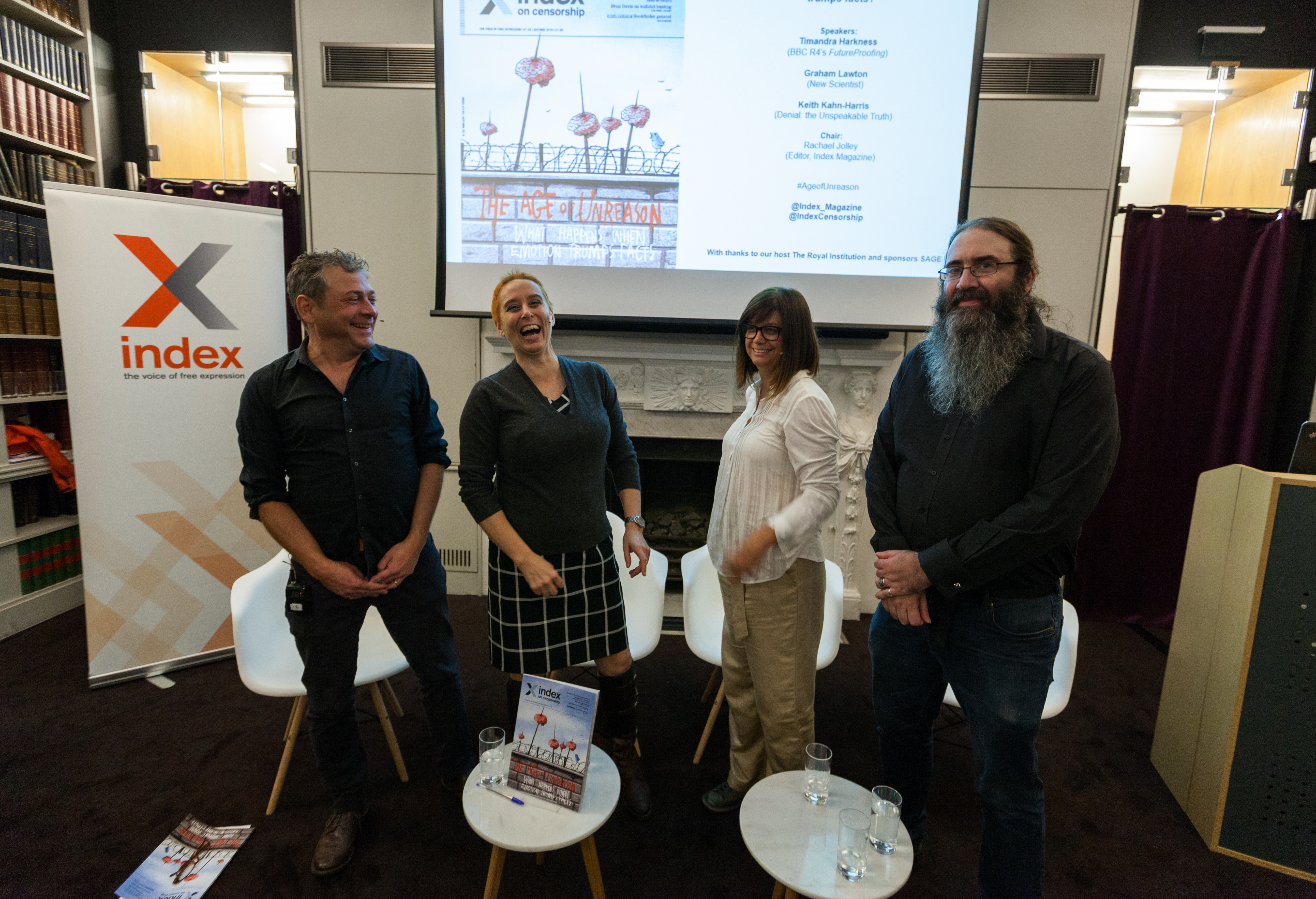[vc_row][vc_column][vc_single_image image=”103062″ img_size=”full” add_caption=”yes”][vc_column_text]“Critical thinking is important, but we should also be teaching scientific literacy and political literacy so we know what knowledge claims to trust,” said Keith Kahn-Harris, author of Denial: The Unspeakable Truth, at a panel debate during the launch of the autumn 2018 edition of Index on Censorship.
The theme of this quarter’s magazine, The Age of Unreason, looks at censorship in scientific research and whether our emotions are blurring the lines between fact and fiction. From Mexico to Turkey, Hungary to China, a whole range of countries from around the globe were covered for this special report, featuring articles from the likes of Julian Baggini and David Ulin. For the launch, a selection of journalists, authors and academics shared their thoughts on how to have better arguments when emotions are high, while exploring concerns surrounding science and censorship in the current global climate.
Aptly taking place at the Royal Institution of Great Britain, the historical home of scientific research for 14 Nobel Prize winners, Kahn-Harris was joined by BBC Radio 4 presenter Timandra Harkness and New Scientist writer Graham Lawton. The discussion was chaired by Rachael Jolley, editor of Index on Censorship magazine.
“Academics and experts are being undermined all over the world,” said Jolley, setting the stage for a riveting conversation between panellists and the audience. “Is this something new or something that has happened throughout history?”
When Jolley asked why science is often the first target of an authoritarian government, Lawton proposed that the value of science is that it is evidence-based and subsequently “kryptonite” to what rigid establishments want to portray. He added: “They depend extremely heavily on telling people half-truths or lies.”[/vc_column_text][vc_single_image image=”103066″ img_size=”full” add_caption=”yes”][vc_column_text]Harkness led a workshop highlighting the importance of applying critical thinking skills when deconstructing arguments, using footage of real-life debates, past and present, to investigate such ideas. Whether it was the first televised contest between presidential candidates John F. Kennedy and Richard Nixon in 1960, or a dispute between Indian civilians over LGBT rights earlier this year, a wide variety of topics and discussions were analysed.
Examining a debate between 2016 presidential candidates Donald Trump and Hilary Clinton, Harkness asked an audience member his thoughts. Focusing on Trump’s approach, he said: “He’s put up a totally false premise which is quite a conventional tactic; you put up something that is not what the other person said, and then you proceed to knock it down quite reasonably because it’s unreasonable in the first place.” Harkness agreed. “It’s the straw man tactic”, she said, “where you build something up and then attack it.”
Panellists began discussing how to argue with say those who deny climate change, with Kahn-Harris contending that science has become enormously specialised over the past centuries, which means people cannot always debunk uncertain claims since they are not specialists. He said: “There’s something tremendously smug about the post-enlightenment world.”
Harkness said “robust challenges” should be sought-after rather than silencing those who share different views, while Lawton added that “storytelling and appealing to emotions are perfectly valid ways of arguing.”
For more information on the autumn issue, click here. The issue includes an article on how fact and fiction come together in the age of unreason, why Indian journalism is under threat, Nobel prize-winning novelist Herta Müller on censorship in Romania, and an exclusive short story from bestselling crime writer Ian Rankin. Listen to our podcast here. Or, try our quiz that decides how prone to bullshit you are…[/vc_column_text][vc_basic_grid post_type=”post” max_items=”4″ element_width=”6″ grid_id=”vc_gid:1538584887174-432e9410-24f0-4″ taxonomies=”8957″][/vc_column][/vc_row]





